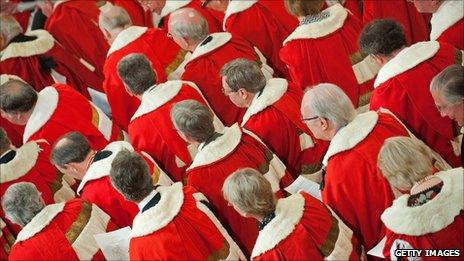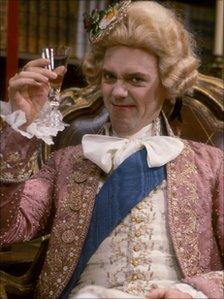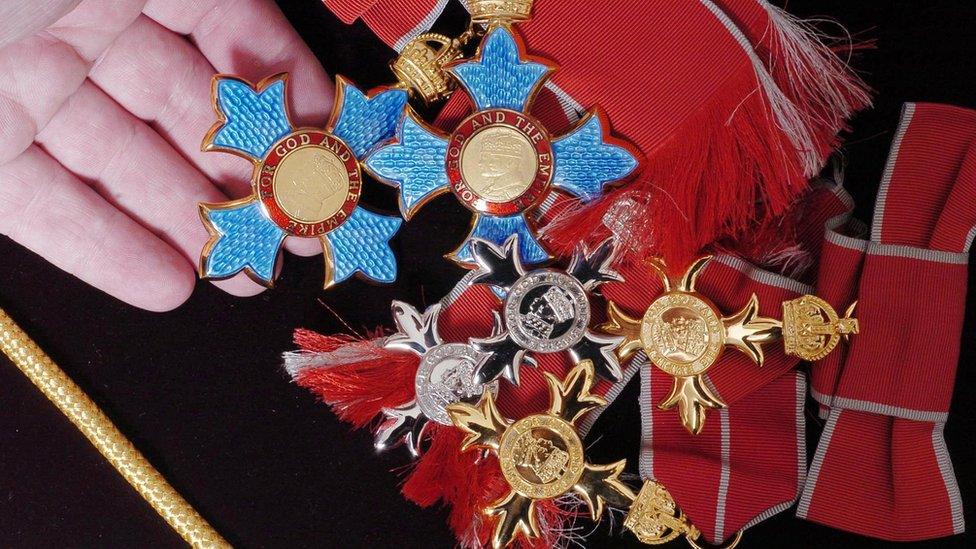Filling the house: Why we need a “Big Society” Lords
- Published

Is reform needed in the House of Lords?
The influential political thinker Phillip Blond - creator of the concept of the "Red Tory" - argues for the continuing importance of the House of Lords and suggests a new shape for the upper chamber.
Mention the House of Lords and what springs to mind is perhaps a combination of figures from the 18th Century. Hogarth etchings, Gillray's caricatures and, in my mind anyway, Hugh Laurie as the Prince Regent in Blackadder.
These images usually involve vast bloated figures, suffering from gout, and ornamented by powdered wigs and a surfeit of land and capital. They seem repulsive parasitic creatures - living off others while denying the common man his due.
Perhaps this is why we are led to believe that everybody everywhere is calling for reform, with the second chamber directly elected, preferably by proportional representation.
Reflecting this purported consensus, the coalition agreement commits the government to bringing "forward proposals for a wholly or mainly elected upper chamber on the basis of proportional representation".
In the meantime the objective is to create "a second chamber that is reflective of the share of the vote secured by the political parties in the last general election".

Laurie's character epitomises the popular conception of the Lords
The Labour party also argued for a fully elected second chamber - favouring a proportional open list system of election.
Iideological ignorance
The idea that wholly electing the Lords makes our system more democratic is dangerous ideological ignorance. Any wholly elected system will mean extending the dominance and control of the main political parties and extending the writ of the executive.
The one thing elections will not do is deliver a chamber more representative of society and all the groups, needs and interests found therein.
We need to recover the traditional meaning and import of the House of Lords and locate that within our own political legacy and context.
The place to begin is the beginning. The House of Lords has its origin in Saxon times when ancient English governance had at its heart a national assembly of the Witan - the wise men of the land.
The wise mediated the writ of the ruler and even on occasion replaced him with a better sovereign.
The implications of a kingly rule that was not in conjunction with the wise was seared on the English and Saxon consciousness by Ethelred II. His calamitous reign ended in 1016 with the occupation of his kingdom by the Danes.
He was known as Ethelred the Unready - not because of a lack of military preparation but because he was uncounselled or "unread".
This council or Witan after the Norman conquest gradually became parliament and as parliament divided into the Commons and the Lords, the second chamber developed along with the nation.
The House of Lords became increasingly the site of dissent and engagement with the king. Despite false memory there were no absolute monarchs in the Middle Ages.
Rrepresent society
The disaster for the Lords was that as Britain developed and the early modern period began, this mediating chamber became captured by one interest - the landowning classes. And this one interest gradually supplanted and neutralised all other interests.
What this teaches us is the danger of letting the Lords represent just one interest and the merits of how it was originally envisaged.
We need to recover a different role for the second chamber such that it can represent what our system of representative democracy excludes : and that is society itself.
Broadly put, the Commons represents the will of the people but the Lords should represent society.
So yes, we do need reform but what we need is a "big society" Lords. We need civil society in the second chamber and that means all of us and our wider affiliations, sympathies and beliefs. The last thing we need are more politicians in thrall to the executive.
Appointment, election, nomination
So I propose the following: That we have a hybrid house - composed a third each of appointment, election and nomination.
Appointment: We should have an appointments panel as now, but their express brief should be to populate the Lords with the widest range and deepest experience of civil society. We want religious leaders of all faiths, universities, schools, charities, trades unions and third sector organisation, prisons the armed services and business leaders, we want them all represented.
Election: I propose that we elect on a county and city basis representatives of the regions and conurbations, with an express remit to relate their areas to the common national good.
Nomination: The house is political. It needs the experience and wisdom of politicians and in some manner the political work of both houses requires integration and continuity. The parties should, perhaps on the basis of their share of the vote, nominate the final third of the Lords.
Democracy needs powers other than democracy - and the greatest power besides the will of the people are the people themselves, their longer interests and their deeper concerns.
If the Lords is reformed it should reflect the big society that is also the good society. Then this would be a welcome modernisation of our mixed constitution and a great good indeed.
You can hear a longer version of this essay in Blond on Britain which was on BBC Radio 4 on Wednesday 15 December at 2045 GMT and will be repeated on Sunday 19 December at 0545 GMT. Or listen via the BBC iPlayer.
Here is a selection of your comments:
There are interesting points in this article but there are important omissions. For example is appointment to the "house of lords" for a limited period or life? I would recommend a longer period or life. The latter gives people more freedom to do what their conscience wants not what politics demands. David, Bristol
Surely it is time for unicameral government in the UK. I agree an elected 'Lords' would be unsatisfactory simply because if elected at the same time as the Commons it would simply be duplication and if elected at a different time would reflect a different public wish and lead to the same mess that we currently have in the US. Why would we want yet another 'advisory quango' of wise men? Nick, Miami, Fl, USA
We are not a true Democracy without an elected Upper Chamber. The House of Lords still has hereditary peers given their title due to their birthright. Lord Archer et al should have been stripped of their titles long ago, in the same vain that Lord Lucan would have been if he was found. Also during Labour's reign many people were made Lords under very dubious circumstances. It is time for change; let's have nurses, entrepreneurs, Youth club Leaders, Businessmen, and Teachers up for election by the Public who pay their wages (expenses) and not as the current Elephant graveyard for failed Speakers, MPs and others who aren't elected. Jeremy, Wokingham, England
I'm strongly in favour of retaining a non-elected Lords. As it stands the Lords has no power to create law, only to amend bills and temporarily block ill-thought legislation. The Lords is in many respects like a newspaper editor - proofing legislation and blocking legislation which would prove damaging or which goes against the grain of a thousand years of legal precedents. Having another elected Lords adds another election to a country with already low turnout, experiencing widespread voter fatigue and apathy. But most dangerously it removes what makes the Lords the best form of check and balance to the executive - that appointments are for life. As such the Lords are able to actually speak their mind, voice their often expert opinion and vote based not on party lines or transient public sentiment, but on whether or not a certain piece of legislation is genuinely in the public interest and most importantly is in accordance with our history, society and traditions. If one is to have two elected houses, one might as well have one. Electing a second house merely to rubber stamp the actions of the first is just an exercise in political vanity. Nick, London
- Published14 December 2010
- Published10 December 2010
